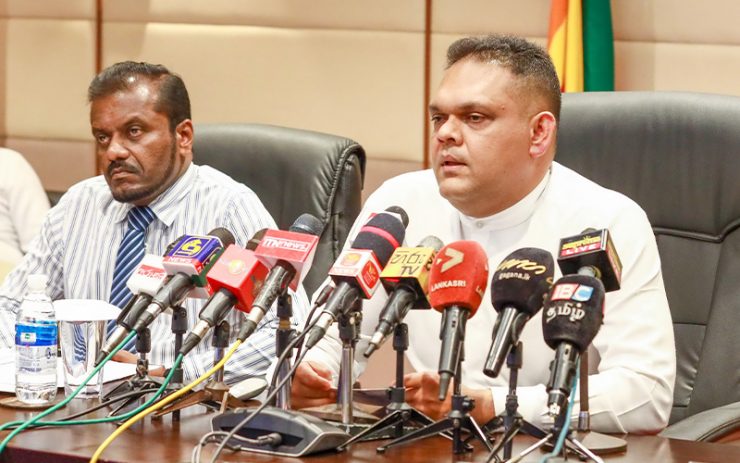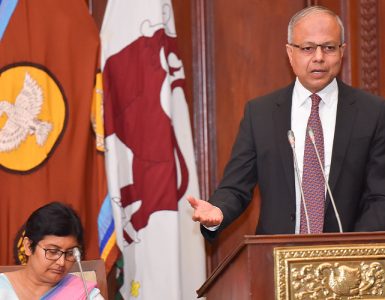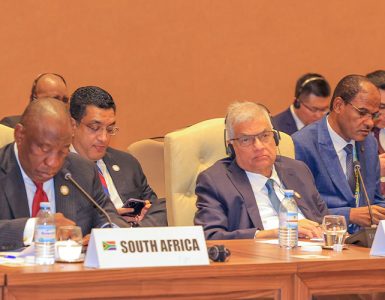State Minister of Finance, Mr. Shehan Semasinghe, has stressed that the current budget, characterized by formal economic management, has been unveiled to proactively avert the recurrence of severe economic crises within the country.
The Minister of State emphasized the dedicated focus within this year’s budget to extend relief to those significantly impacted by the economic downturn. Furthermore, there is a deliberate commitment to fostering the establishment and support of small and medium-scale businesses as part of the comprehensive economic strategy.
The Minister of State for Finance expressed these views during a discussion held yesterday (20) at the Ministry of Finance on the 2024 budget.
Further contributing to the discussion, Minister Shehan Semasinghe remarked:
The budget presented this year has laid the groundwork for growth across various sectors of the economy. To foster economic growth, it is imperative to restore the country to the pre-crisis economic levels. The groundwork for this resurgence was established in the previous budget. The current year’s budget is designed to further fortify economic stability and the progress in achieving this stability can be verified by scrutinizing data provided by the Central Bank.
During the presentation of the 2023 budget, the nation found itself in a precarious situation, unable to produce a comprehensive budget document. At that critical juncture, the country grappled with profound economic downturn and political-social turbulence, marking a significant crossroads in its history.
It is noteworthy to acknowledge that the attained economic stability is a direct outcome of the 2023 budget document. Additionally, the government anticipates a 1.8% economic growth for the upcoming year, with aspirations to surpass that target and achieve a growth rate of 2% or more. The formulation of this year’s budget took into account agreements established with the International Monetary Fund and the nation’s creditors. Of particular significance is the commitment to achieving debt sustainability, thereby emphasizing meticulous attention to debt restructuring and various other considerations in the preparation of the budget proposals.
The government has prioritized addressing the challenges faced by population groups severely affected by the on-going economic crisis. Special consideration has been given to public servants, who have not seen a salary increase in many years. Consequently, the government has taken the initiative to grant an additional allowance of Rs. 10,000.
Furthermore, focused attention has been extended to various vulnerable groups, including low-income earners, kidney patients, individuals receiving disability allowances and those receiving elderly allowances. This comprehensive approach is expected to benefit approximately 3 million families.
As per the economic crisis, small and medium-sized businesses, which faced significant challenges, have been a focal point. The current budget allocates over Rs. 30 billion for their rehabilitation. A structured system has been devised to facilitate their access to credit facilities, offering subsidized interest rates in the single-digit range. Furthermore, the government has lifted restrictions on imports, excluding personal-use vehicles, in a move aimed at fostering greater economic flexibility and adaptability.
Director General of the President’s Trade Union, Mr. Saman Ratnapriya, commended President Ranil Wickremesinghe for steering the country from a challenging state, marked by fuel and gas queues, to a more stable condition. He attributed this progress to the foundation laid by the previous budget, extending into the 2024 budget. Mr. Ratnapriya highlighted a proposal to increase government employee salaries by Rs. 10,000, acknowledging the existing pressures on the public.
Acknowledging the current challenges faced by the populace, including the burden of elevated service charges, it is imperative to recognize the potential positive outcomes of advancing with the President’s economic program. Despite the existing pressures, the belief is firm that adhering to this economic strategy will pave the way for the construction of a robust and sustainable economy.
On the fiscal front, Mr.W. M. G. Kumaratunga, Director of the Economic Stabilization Unit at the President’s Office, provided insights into revenue collection. Noting the significant milestone, he projected estimated state revenue of Rs. 3,101 billion by December 31, surpassing the Rs.3 trillion marks for the first time in history. Comparatively, the revenue as of last 17 stood at Rs. 2,394 billion, with contributions from the Inland Revenue Department Rs. 1,415 billion, Sri Lanka Customs Rs.832 billion, and the Excise Department Rs.147 billion.
As the year draws to a close, an estimated income of Rs.3,101 billion is anticipated from the combined efforts of the Inland Revenue Department, Sri Lanka Customs and the Excise Department. Additionally, a further Rs.369 billion is expected to be generated in the coming days. This additional revenue comprises Rs.154 billion from the Inland Revenue Department, Rs. 136 billion from Sri Lanka Customs and the remaining Rs. 33 billion from the Excise Department.
Consequently, by December 31 of this year, a total state revenue of Rs.2,719 billion is anticipated. However, if efforts align with the estimated target for 2023, this figure would represent the highest state revenue ever recorded in the country’s history.
In addition to the on-going efforts, the President’s Office has initiated special programs aimed at further augmenting state revenue. Notably, the daily income of Sri Lanka Customs has currently reached an impressive Rs. 5 billion. The aspiration is to achieve a revenue target of Rs. 3 trillion, a milestone that could significantly boost the country’s economy, leading to the creation of a surplus in the primary account.
This critical discussion involved the active participation of key stakeholders, including Dr. P. K. G. Harishchandra, Director of the Economic Research Department at the Central Bank, Chairman of the National Youth Service Council, Mr. Pasindu Gunaratne and representatives from trade unions, the Youth Corps and the Youth Service Council.






